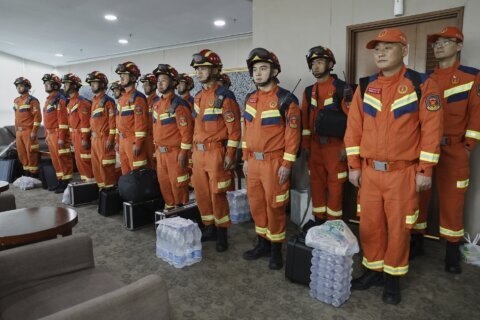Tokyo (CNN) — Yuki Watanabe used to spend 12 hours every day toiling away in the office. And that’s considered a short day.
A typical 9-to-9 workday is the bare minimum. “The latest I would leave [the office] would be 11 p.m.,” said the 24-year-old, who used to work for some of Japan’s largest telecoms and e-payment companies.
So intense were the demands that Watanabe — who used an alias to speak to CNN, for fear of jeopardizing future job prospects — began to develop health problems. She had “shaky legs and stomach issues.”
She knew she had to quit, but there was one thing in the way: Japan’s notoriously top-down work culture.
Asking to leave work on time or taking some time off can be tricky enough. Even trickier is tendering a resignation, which can be seen as the ultimate form of disrespect in the world’s fourth-biggest economy, where workers traditionally stick with one employer for decades, if not for a lifetime.
In the most extreme cases, grumpy bosses rip up resignation letters and harass employees to force them to stay.
Watanabe was unhappy at her previous job, saying her former supervisor often ignored her, making her feel bad. But she didn’t dare resign.
“I didn’t want my ex-employer to deny my resignation and keep me working for longer,” she told CNN during a recent interview.
But she found a way to end the impasse. She turned to Momuri, a resignation agency that helps timid employees leave their intimidating bosses.
For the price of a fancy dinner, many Japanese workers hire these proxy firms to help them resign stress-free.
The industry existed before COVID. But its popularity grew after the pandemic, after years of working from home pushed even some of Japan’s most loyal workers to reflect upon their careers, according to human resources experts.
There is no official count on the number of resignation agencies that have sprung up across the country, but those running them can testify to the surge in demand.
‘I can’t do this anymore’
Shiori Kawamata, operations manager of Momuri, said that in the past year alone they received up to 11,000 enquiries from clients.
Located in Minato, one of Tokyo’s busiest business districts, the firm launched in 2022 with a name that seeks to resonate with their helpless clientele — “Momuri” means “I can’t do this anymore” in Japanese.
At a cost of 22,000 yen (about $150) — or 12,000 yen for those who work part time — it pledges to help employees tender their resignations, negotiate with their companies and provide recommendations for lawyers if legal disputes arise.
“Some people come to us after having their resignation letter ripped three times and employers not letting them quit even when they kneel down to the ground to bow,” she said, in another illustration of the deferential workplace culture embedded in Japan.
“We sometimes get calls from people crying, asking us if they can quit their job based on XYZ. We tell them that it is OK, and that quitting their job is a labor right,” Kawamata added.
Some workers complain that bosses harass them if they try to resign, she said, including stopping by their apartments to ring their doorbell repeatedly, refusing to leave.
For another quitter, what would have been a straightforward business took a bizarre turn. The person was dragged to a temple in Kyoto by their boss. “[The worker] was told to go to Onmyoji temple because ‘they were cursed,’” she said.
Kawamata said people who reach out often work for small to medium-sized businesses, with those in the food industry most vulnerable, followed by health care and welfare.
Death by overwork
Japan has long had an overwork culture. Employees across various sectors report punishing hours, high pressure from supervisors and deference to the company. These employers are widely known as “black firms.”
Human resources professor Hiroshi Ono, from Hitotsubashi University Business School in Tokyo, said the situation had become so pressing that the government had begun publishing a list of unethical employers to hamper their ability to hire, and warn job seekers of the dangers of working for them.
“There are some issues with … black firms, where working conditions are so bad, there’s no psychological safety, and some employees might feel threatened,” he said.
More than 370 companies have been blacklisted by labor bureaus across the country since the list was published in 2017.
The stress has proven fatal for decades, as exemplified by a phenomenon called “karoshi,” or “death by overwork.”
According to the Ministry of Health, Labour and Welfare, 54 people died from work-induced brain and heart conditions and were granted compensation in 2022, which is actually a major decline from the 160 recorded two decades ago.
But the number of people filing claims over mental stress at work is on the rise, shooting up to 2,683 from 341 over the same period of time.
A 31-year-old political reporter from national broadcaster NHK died in 2017 after suffering heart failure caused by spending long hours on the job. She worked 159 hours of overtime in the month before her death.
Five years later, a 26-year-old doctor from a hospital in Kobe died by suicide after working more than 200 hours of overtime in a single month.
Hisakazu Kato, an economics professor at Meiji University in Tokyo, said the country has labor laws in place to protect workers and make sure they are free to resign.
“But sometimes the atmosphere in the workplace makes it difficult to say so,” he said.
Changing youth work culture
So why did these resignation agents only emerge in recent years? That, experts say, is down to young people’s changing approach to work.
“When one party is unhappy, you could end up in a divorce. But like a divorce, nobody is 100% faultless, right?” Ono, from Hitotsubashi University, said.
As the country grapples with a labor shortage fueled by a rapidly aging population and declining birthrates, young people now have more say in the market than their predecessors.
Many of them no longer subscribe to older generations’ thinking that one should do whatever they are told regardless of the job’s nature, Ono said, adding that when there is a mismatch of expectation, they won’t hesitate to quit.
But that doesn’t mean they want to march into their boss’s office and quit in a blaze of glory — preferring to let a third party handle it.
“I think that younger people these days are more nonconfrontational,” the expert said, noting that many have been deprived of social interactions at work due to COVID. As a result, young workers prefer to quit without having direct contact with their bosses.
But Ono suggested that it’s always good to have a discussion and not to burn bridges with employers, so he would recommend against accessing such services.
Kawamata, from Momuri, somewhat agreed.
“We honestly think that our resignation agency service should disappear from society and we hope for that. We think it’s best if people can tell their bosses themselves, but hearing the horror stories of our clients, I don’t think that our business will disappear anytime soon,” she said.
For now, Momuri offers a 50% discount for those who seek their service to resign the second time.
The-CNN-Wire
™ & © 2024 Cable News Network, Inc., a Warner Bros. Discovery Company. All rights reserved.







